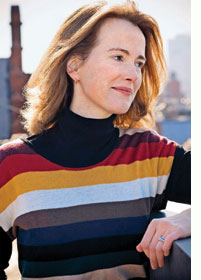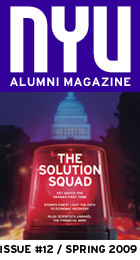travel writing
Americans Abroad
In Daphne Beal’s debut novel, an adventurous young woman comes of age in Nepal
by Eryn Loeb / GSAS ’07
In 1989, eager for a break from her theory-obsessed, hyperpolitical college campus, Daphne Beal (GSAS ’98) spent a year living in Nepal and quickly fell under its spell. Ending up there, she says, was “a bit of dumb luck,” but as she studied and trekked through the mountainous country, its beautiful landscape and suffused sense of spirituality began to ease her restlessness. “And I really loved that it had a stronger oral tradition than a literary tradition,” Beal remembers. “Even then I knew that I wanted to be a writer.”
 Daphne Beal creates rich characters while critiquing the ex-pat experience.
Daphne Beal creates rich characters while critiquing the ex-pat experience.
After she returned to the United States and graduated from Brown University, the experience kept a tight hold on her. Over the years, as Beal pursued a journalistic career, she thought about it all the time. “It was almost like being obsessed with someone you’d once been in love with,” she says. While some of her journalism work focused on the region, Beal felt she could engage more deeply with her own understanding of it through fiction. Writing a story based in Nepal seemed a good excuse to dwell on the memory of her time there and to untangle some of her thoughts from that early trip, as well as subsequent visits to the region. The result appeared last summer: In the Land of No Right Angles (Anchor), Beal’s gorgeous, stirring first novel.
At its center is Alex, a 20-year-old Midwestern woman traveling through Nepal on leave from college, and the prickly, intense friendships she forms with a young Nepali woman named Maya and with Will, an older expat American on an endless quest for enlightenment—which he seeks mostly through a parade of young, attractive women. The three conspire, dream, and drift apart over a period of eight years, culminating in a fraught reunion in Bombay.
Throughout the book, Alex wrestles with what it means to be an outsider in the place that’s captured her heart. It’s a struggle that Beal based largely on feelings of her own. “I never would have written the story from the point of view of Maya,” she says, conjecturing that Alex is about “40 percent me and 60 percent everyone I ever met there.” Nepal’s landscape is a character in itself, and as Alex, Maya, and Will climb mountains, bike around Kathmandu, and hike through pouring rain, Beal renders it vividly, detailing the intoxicating sensations of exploring a faraway place. “There’s a great kind of narcissism to being 20 that’s fun—and also fun to grow out of,” Beal reflects, describing both her characters and the spate of Western students who come of age in foreign settings.
In the mid-1990s Beal worked at The New Yorker, an experience she credits with honing her attention to detail. Her journalistic work proved an easy complement to writing fiction—an essay she reported for McSweeney’s about Falkland Road, Bombay’s notorious red-light district, provided plenty of fodder for her novel. “I’m happy, in my late thirties, to figure out that what makes a good story in a fictional narrative also makes a good story as a nonfictional narrative,” she says. “I don’t really think of myself as either a novelist or a journalist; I think of myself as a writer. It’s all much more melded than I once imagined it was.”
As for her next book? She’s still circling around the exact story, but it will be set in the Midwest, where she—like Alex—is originally from. “The setting of rural northern Wisconsin is something that I think about when I’m daydreaming,” she says.
photo © Kevin Sturman
“There’s a great kind of narcissism to being 20 that’s fun—and also fun to grow out of.”







